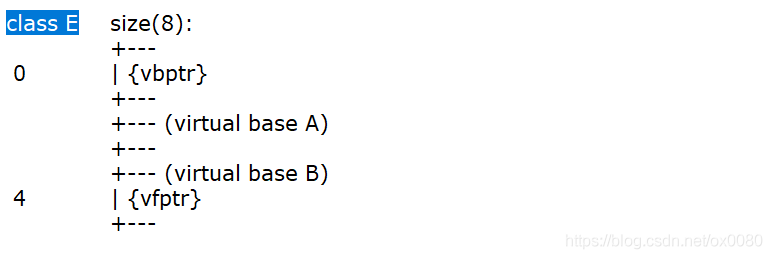空类,声明时编译器不会生成任何成员函数
对于空类,编译器不会生成任何的成员函数,只会生成1个字节的占位符。
有时可能会以为编译器会为空类生成默认构造函数等,事实上是不会的,编译器只会在需要的时候生成6个成员函数:一个缺省的构造函数、一个拷贝构造函数、一个析构函数、一个赋值运算符、一对取址运算符和一个this指针。
1
2
3
4
5
6
7
8
9
10
11
12
13
14
15
16
17
18
19
20
21
22
23
24
25
26
27
28
29
30
31
32
33
34
35
36
37
| #include <iostream>
using namespace std;
class A
{
};
class B
{
virtual bool compare(int a,int b) = 0;
};
class C:public A,public B
{
};
class D:public A,public B
{
virtual bool compare(int a, int b) = 0;
};
class E :virtual A, virtual B
{
};
class F :virtual A, virtual B
{
virtual bool compare(int a, int b) = 0;
};
int main()
{
cout << "A zize:" << sizeof(A) << endl;
cout << "B zize:" << sizeof(B) << endl;
cout << "C zize:" << sizeof(C) << endl;
cout << "D zize:" << sizeof(D) << endl;
cout << "E zize:" << sizeof(E) << endl;
cout << "F zize:" << sizeof(F) << endl;
system("pause");
return 0;
}
|






分析:
类A是空类,但空类同样可以被实例化,而每个实例在内存中都有一个独一无二的地址,为了达到这个目的,编译器往往会给一个空类隐含的加一个字节,这样空类在实例化后在内存得到了独一无二的地址,所以sizeof(A)的大小为1。
类B里面因有一个纯虚函数,故有一个指向虚函数的指针(vptr),32位系统分配给指针的大小为4个字节,所以sizeof(B)的大小为4。类C继承于A和B,编译器取消A的占位符,保留一虚函数表,故大小为4。类D继承于A和B,派生类基类共享一个虚表,故大小为4。类E虚继承A和B,含有一个指向基类的指针(vftr)和一个指向虚函数的指针。类F虚继承A和B,含有一个指向基类的指针(vftr)和一个指向虚函数的指针。
空类,定义时会生成6个成员函
等价于:
1
2
3
4
5
6
7
8
9
10
| class Empty
{
public:
Empty();
Empty(const Empty &rhs);
~Empty();
Empty& operator=(const Empty &rhs);
Empty* operator&();
const Empty* operator&() const;
};
|
使用时的调用情况:
1
2
3
4
5
6
7
8
|
Empty *e = new Empty();
delete e;
Empty e1;
Empty e2(e1);
e2 = e1;
Empty *pe1 = &e1;
const Empty *pe2 = &e2;
|
C++编译器对这些函数的实现:
1
2
3
4
5
6
7
8
9
10
11
12
13
14
15
16
17
18
19
20
21
22
23
24
25
26
|
inline Empty::Empty()
{
}
inline Empty::~Empty()
{
}
inline Empty *Empty::operator&()
{
return this;
}
inline const Empty *Empty::operator&() const
{
return this;
}
inline Empty::Empty(const Empty &rhs)
{
}
inline Empty& Empty::operator=(const Empty &rhs)
{
}
|











